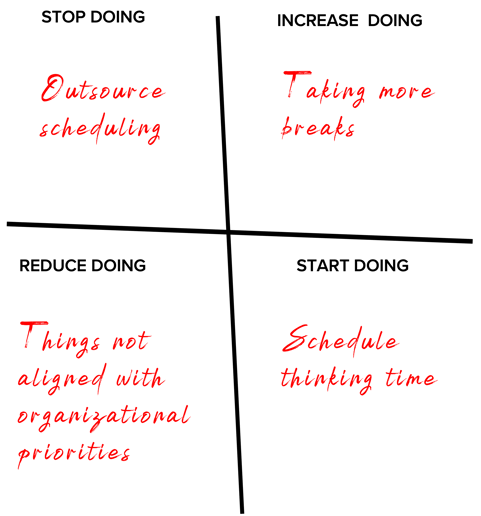"Everyone’s work and mindset towards it should now reflect EXECUTION, INNOVATION, and EXPLORATION.”
- Greg McKeown, Essentialism
Here at Studio/E we have had the great privilege of supporting hundreds of organizations and thousands of leaders in courageously exploring the unknown. Sometimes it is simply about adopting a new, exploratory mindset. Other times we go deep helping teams launch new initiatives and innovations. In all cases, our efforts and attention center around exploring something completely new that creates new value; something truly unknown for our clients. As you can imagine, we have racked up quite the laundry list of obstacles that stand in the way of leaders and teams tackling such important and necessary endeavors. The most common – impacting nearly everyone we have worked with – is time.
Every one of us has the same amount of time. You have no more and no less time in your day than the likes of Oprah, the Dalai Lama, and the late Steve Jobs. 24 hours. 1,440 minutes. 86,400 seconds – that’s what a day is comprised of. For each of us. Yet, our ability to organize and prioritize (dare I say control) our time in the most meaningful and effective way varies dramatically for each of us. We hear it all-too often, “I don’t have time for ______. I’m too busy doing ______. If only I had more time!” Our to-do list (or worse, someone else’s to-do list) consumes much of our time.
To break out of the mold and overcome this time obstacle, adopting a portfolio approach to time has proven to be highly effective. And when it comes to exploring the unknown and moving new ideas forward, we have found a 70/20/10-time portfolio is an ideal place to start.
- 70% Execution. These are our day-to-day tasks and responsibilities. Following existing systems and processes, this 70% is how our businesses and lives are run.
- 20% Innovation. This is time spent working on enhancing our operation, finding new efficiencies, and creating improvements to the way we execute.
- 10% Exploration. This is getting out from under our routine and predictable tasks and responsibilities to gain new knowledge and insights. With exploration, the real value is created when you bring new learnings back and apply them to your business and life in a meaningful way. This is where new possibilities and values are discovered!
Here is the conundrum. Most of us and our organizations are well above 70% execution. Heck, we have had some of the best performing teams and leaders take pride in being close to 100% execution. But if you are playing the long game, this approach will not cut it.
So how can you make time for the 20% and 10%? The following three steps can help:
1. Assess your current time mix.
When it comes to making change, having awareness for where you are today is an ideal first step. We recommend looking at your calendar over the past week and doing a quick inventory. How much of your time is being used for each (Execution, Innovation and Exploration)? Are you close to the 70/20/10 mix? What other observations do you have about how you are spending your time?
2. Create space for the 20% and 10%
Much like shaking up a marketplace with a new, innovative offering, identifying ways to disrupt and dislodge time from your overwhelming calendar is the next step. To do this we have repurposed the framework made popular in Blue Ocean Strategy. Take about 15 minutes and work through the following categories to create a list of ways you can effect change and create space for the 20% and 10%.

Identify one item from each of the four categories you can take action on right away.
3. Use your time wisely.
Putting your new insights into action and designing your time to reflect your desired portfolio time mix is where the magic happens. One approach to this can be using the Studio/E Priority Coach that can help you identify and take action against your highest-level priorities. Another method could be implementing the time blocking time management technique made popular by Cal Newport in his book Deep Work. Both are great ways to proactively identify and set aside time to do your most important work.
We are masterful at getting the urgent and important tasks done. Yet it is within our ability to dedicate time to the less urgent but equally important work we have in front of us that can really set us apart and allow us to move our ideas and lives forward. In the great words of our dear friend Greg McKeown, “If you don’t prioritize your life, somebody else will.”
Questions to Explore:
1. What is something you would like to explore but do not have time for?
2. What is your current time portfolio mix? Is it 70/20/10?
3. What changes can you make to create more time for exploration?



SUBMIT YOUR COMMENT